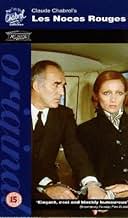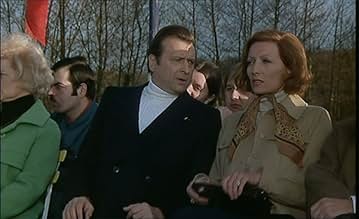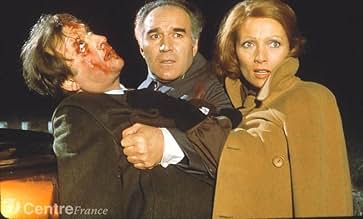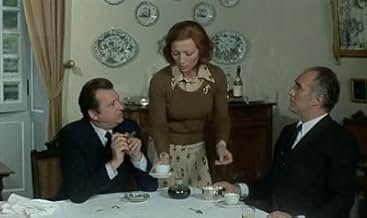AVALIAÇÃO DA IMDb
6,9/10
2,2 mil
SUA AVALIAÇÃO
Adicionar um enredo no seu idiomaIn a small French town, the mayor discovers his wife is cheating on him, a betrayal that eventually leads to murder.In a small French town, the mayor discovers his wife is cheating on him, a betrayal that eventually leads to murder.In a small French town, the mayor discovers his wife is cheating on him, a betrayal that eventually leads to murder.
- Direção
- Roteiristas
- Artistas
- Prêmios
- 1 vitória e 1 indicação no total
- Direção
- Roteiristas
- Elenco e equipe completos
- Produção, bilheteria e muito mais no IMDbPro
Avaliações em destaque
I was very surprised upon reading some of the comments for this film after having seen it - not only is this not a lesser Chabrol movie or a non-entertaining one, for my money its Chabrol at his subtle and intriguing best, and no doubt up there with the likes of The Unfaithful Wife and Le Boucher! The plot is not particularly original, but it's not too important as it's Chabrol's style and attention to detail that really makes the film what it is anyway. The plot seems to take a lot of influence from the classic 'The Postman Always Rings Twice' and focuses on murder due to an illicit love affair. Lucienne Delamare is not so happily married to town major Paul Delamare and, unbeknown to her husband, is currently engaged in an affair with her husband's assistant Pierre Maury. The two are able to spend time together because Paul is often away on business. Pierre's wife Clotilde is weak and sick and when she dies suddenly, the town suspect suicide; but the truth is more sinister, as revealed by Pierre's confession to Lucienne...
The film is kept interesting as Chabrol always focuses on the important elements and ensures that the chemistry between the leads is always engaging. The acting is once again superb with Chabrol's beautiful wife (at the time) Stéphane Audran being suitably brooding and mysterious in the lead role and receiving excellent support from Michel Piccoli and Claude Piéplu. The village in which the film takes place is also well thought out and Chabrol manages to create a foreboding atmosphere stemming from that. As usual with Chabrol films, this one is beautifully shot and realised and it's clear that the director put a lot of care and attention into the film. As usual, the suspense is generated through intrigue and the way that the characters are developed rather than through scenes of tension, though there are some brilliant sequences in the film - a pivotal scene towards the end involving a car accident being particularly noteworthy. I wouldn't recommend this film as a starting point for someone who has not previously seen a Claude Chabrol film, but I'd be surprised if fans of his don't enjoy it. Highly recommended!
The film is kept interesting as Chabrol always focuses on the important elements and ensures that the chemistry between the leads is always engaging. The acting is once again superb with Chabrol's beautiful wife (at the time) Stéphane Audran being suitably brooding and mysterious in the lead role and receiving excellent support from Michel Piccoli and Claude Piéplu. The village in which the film takes place is also well thought out and Chabrol manages to create a foreboding atmosphere stemming from that. As usual with Chabrol films, this one is beautifully shot and realised and it's clear that the director put a lot of care and attention into the film. As usual, the suspense is generated through intrigue and the way that the characters are developed rather than through scenes of tension, though there are some brilliant sequences in the film - a pivotal scene towards the end involving a car accident being particularly noteworthy. I wouldn't recommend this film as a starting point for someone who has not previously seen a Claude Chabrol film, but I'd be surprised if fans of his don't enjoy it. Highly recommended!
This film has a persistently artificial feel to it that at times serves it well and at times is a hindrance - it sometimes serves to highlight the hypocrisy and corruption of the milieu and give the central characters a decadent air, but at times it interferes with character development, as it interferes with our understanding of the characters. The plot itself is rather conventional but is essentially an excuse to dissect a certain milieu. The most interesting character is in my opinion very underrated: the mayor's stepdaughter, who is clearly intelligent, somewhat sombre but decidedly not bookish. She is the sole character that does not seem motivated by purely selfish, fairly conventional motives (money, political ambition, boredom, sexual desire, etc), making her motivations harder to fathom. She is the only character with any real mystery about her; it's hinted she has some kind of fascination with death, and she makes a surprising comment related to the role of women, all of which add to her ambiguity as a character.
In a small town in France, the mayor Paul Delamare (Claude Piéplu) invites the leftist Pierre Maury (Michel Piccoli) to be his deputy mayor in his reelection. Paul is married to Lucienne Delamare (Stéphane Audran) and stepfather of Lucienne's teenage daughter Hélène Chevalier (Eliana De Santis), but sexually neglects Lucienne. Pierre is married to the weak, sick and bitter Clotilde Maury (Clotilde Joano). Soon Pierre and Lucienne have a torrid lover affair during Paul's frequent travels to Paris. When Clotilde dies, the doctor believes it was a suicide, and the case is closed by the police. Paul proposes a dirty real estate business to Pierre to lure the inhabitants of the town and make lots of money, but Pierre is reluctant to accept the proposal. Pierre discloses to Lucienne that he killed Clotilde that was very ill, and they should take care with their encounters to avoid gossips and suspicion from the locals. When Pierre travels to Paris, Lucienne spends the night with Pierre, and when she returns home at 4:00 AM, Pierre surprises her since he has not traveled. He calls Pierre and uses his affair to force Pierre to accept the dirty deal. Now Paul will travel to Paris, and Lucienne asks him to go with him. While Lucienne is driving in the lonely road, she stops the car on the shoulder and Pierre kills Paul and burns the car to the ashes simulating an accident. The police clear Lucienne and close the case as car accident, but Pierre advises her not to see each other for a long period. Everything is perfect for the two lovers until something unexpected happens.
"Les noces rouges", a.k.a "Wedding in Blood" (1973), is a suspenseful romance by Claude Chaborl, with naive plot point and conclusion. The plot is excellent until the moment that Hélène writes a letter to the chief of police. Maybe such naivety could be acceptable in 1973, in the countryside of France. However, on the present days, it would be ridiculous. But the politician Pierre confessing his murders, including his wife's one, and without a lawyer is not acceptable. Romantically it might work but is not credible. My vote is seven.
Title (Brazil): "Amantes Inseparáveis" ("Inseparable Lovers")
"Les noces rouges", a.k.a "Wedding in Blood" (1973), is a suspenseful romance by Claude Chaborl, with naive plot point and conclusion. The plot is excellent until the moment that Hélène writes a letter to the chief of police. Maybe such naivety could be acceptable in 1973, in the countryside of France. However, on the present days, it would be ridiculous. But the politician Pierre confessing his murders, including his wife's one, and without a lawyer is not acceptable. Romantically it might work but is not credible. My vote is seven.
Title (Brazil): "Amantes Inseparáveis" ("Inseparable Lovers")
A few years after being one of the French New Wave four aces, Claude Chabrol said goodbye to film experiments and embarked on a very active commercial directorial career. For over 30 years he has produced films at a rate of about one each year, most of them thrillers, whose heroes belong to the French bourgeoisie, high or mid-class. 'Les noces rouges' made in 1973 belongs to these years. The setting in which the action takes place is a small French town where everybody knows everybody and where secrets seem very difficult to keep. And yet, from the first scenes of the film we realize that behind the quiet streets and facades, in the villas or apartments of the heroes with comfortable furniture and beautiful objects, there are hidden passions and secrets. Sooner or later, it is inevitable that corpses will show up.
If we were to look for a motto for this film, it would be 'how stupid lovers can be'. With question mark or exclamation mark - you can choose. Lucienne (Stéphane Audran) has an extramarital affair with Pierre Maury (Michel Piccoli), the deputy of her husband, the politician, mayor and representative Paul Delamare (Claude Piéplu). Both are unhappily married, which would be the justification for their infidelity that combines the passion and the grotesque, because in a provincial town like the one where they live (and where they also are public figures) such liaisons are difficult to consume and keep secret. Is murder the only way out? The script is inspired by a true crime case, so it seems that life not only beat the film but in this case even anticipated it.
As in many other films of Claude Chabrol it is difficult to cling to a character and identify with him or her. Paul's sick wife and Lucienne's teenage daughter may be the only innocent figures in this quiet but sinister story, sinister because of the violence that erupts in various forms, and because of the moral decay of the characters, be they criminals or victims. Lucienne's character seemed insufficiently developed, I think it was a much more interesting story than it results from the film in the biography of this woman who begins her life as a teenage mother, marries a man who does not love her but yet she supports his political career and keeps the social appearances, only to fall prey to passion on a path that can only lead to tragedy. Stéphane Audran seemed less inspired than in other films, Michel Piccoli does a good role but not one of his best, and Claude Piéplu, the less famous of the three, manages to create the most interesting character as the husband who accepts his wife's infidelity, being more much interested in his political career sprinkled with dubious business. The thriller plot plays a secondary role, the social commentary and the characterization of the characters seem to be the focal points of the director. Also pay attention to the costumes created by Karl Lagerfeld. 'Les noces rouges' may not be a high point in the career of Chabrol or his actors, but there are enough good reasons to give him a chance to watch or revise.
If we were to look for a motto for this film, it would be 'how stupid lovers can be'. With question mark or exclamation mark - you can choose. Lucienne (Stéphane Audran) has an extramarital affair with Pierre Maury (Michel Piccoli), the deputy of her husband, the politician, mayor and representative Paul Delamare (Claude Piéplu). Both are unhappily married, which would be the justification for their infidelity that combines the passion and the grotesque, because in a provincial town like the one where they live (and where they also are public figures) such liaisons are difficult to consume and keep secret. Is murder the only way out? The script is inspired by a true crime case, so it seems that life not only beat the film but in this case even anticipated it.
As in many other films of Claude Chabrol it is difficult to cling to a character and identify with him or her. Paul's sick wife and Lucienne's teenage daughter may be the only innocent figures in this quiet but sinister story, sinister because of the violence that erupts in various forms, and because of the moral decay of the characters, be they criminals or victims. Lucienne's character seemed insufficiently developed, I think it was a much more interesting story than it results from the film in the biography of this woman who begins her life as a teenage mother, marries a man who does not love her but yet she supports his political career and keeps the social appearances, only to fall prey to passion on a path that can only lead to tragedy. Stéphane Audran seemed less inspired than in other films, Michel Piccoli does a good role but not one of his best, and Claude Piéplu, the less famous of the three, manages to create the most interesting character as the husband who accepts his wife's infidelity, being more much interested in his political career sprinkled with dubious business. The thriller plot plays a secondary role, the social commentary and the characterization of the characters seem to be the focal points of the director. Also pay attention to the costumes created by Karl Lagerfeld. 'Les noces rouges' may not be a high point in the career of Chabrol or his actors, but there are enough good reasons to give him a chance to watch or revise.
Under the surface of middle class boredom and entrapment, love for the forbidden and unattainable drives two respectable, kind people to murder. It isn't realistic, yet feels real, as does the daughter's unconscious urge to destroy her beloved mother. The murder victims are at once pitiable and richly deserve their ends. The performances are great all round.
Você sabia?
- ConexõesFeatured in Mulheres Diabólicas (1995)
Principais escolhas
Faça login para avaliar e ver a lista de recomendações personalizadas
- How long is Wedding in Blood?Fornecido pela Alexa
Detalhes
- Data de lançamento
- Países de origem
- Idioma
- Também conhecido como
- Assassino Amante
- Locações de filme
- Valençay, Indre, França(main location: street scenes, cemetery, Maury's apartment 31 Rue de la République)
- Empresas de produção
- Consulte mais créditos da empresa na IMDbPro
- Tempo de duração1 hora 30 minutos
- Mixagem de som
- Proporção
- 1.66 : 1
Contribua para esta página
Sugerir uma alteração ou adicionar conteúdo ausente













